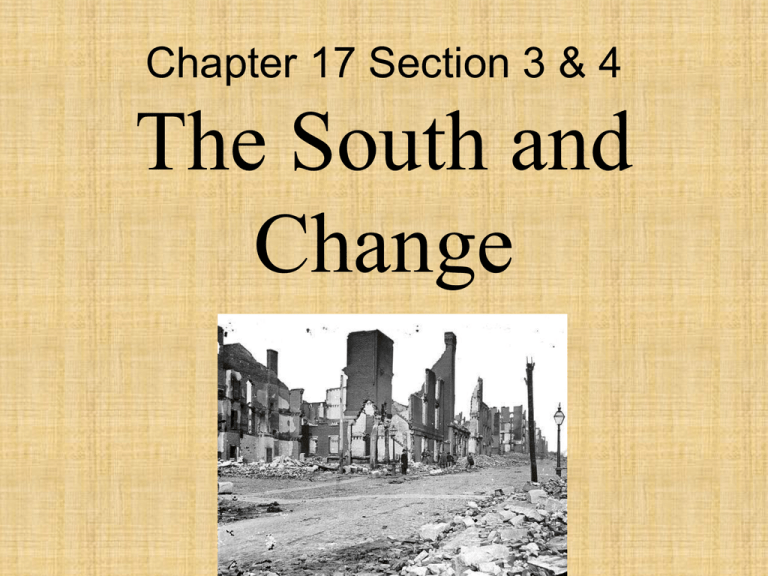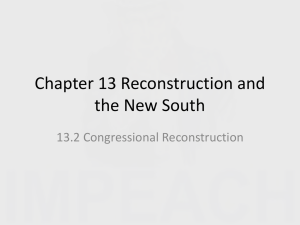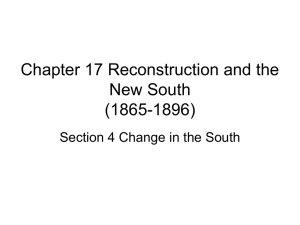File
advertisement

Chapter 17 Section 3 & 4 The South and Change African Americans in Government • Shortly after the Civil War, African Americans played an important role in politics both as voters and elected officials. African Americans in Government • Between 1869-1880, 16 African Americans served in the House of Representatives and 2 in the Senate. Hiram Revels • An ordained minister who recruited African American soldiers during the Civil War. • Was elected to the U.S. in 1870. Blanche K. Bruce • A former escaped slave who taught in a school for African Americans. • Was elected to the U.S. in 1874. Scalawags • White southerners who supported Republican reconstruction efforts. • Others southerners called them this name meaning “scoundrel”. Carpetbaggers • Northern whites who moved to the south after the war, many times in search of cheap land. • Called this because they usually carried their belongings in a cheap bag made from carpet fabric. Resistance to Reconstruction • Most white Southerners opposed any effort to give African Americans rights. The Ku Klux Klan • Organization that used fear and violence to deny rights to freed men and women. • Killed thousands of African Americans and their white supporters. The Ku Klux Klan • Burned African American homes, schools, and churches. • They had strong support from planters and Democrats across the South. The Ku Klux Klan • In 1870 and 1871 Congress passed several laws to allow the federal government to fight the Klan. Education • African Americans with help from the Freedman’s Bureau built many schools throughout the South. • African Americans and white students generally would attend different schools. Education • Only very few schools were integrated, including white and African American students. Sharecropping • African Americans still had a difficult time purchasing any land of their own. • In this system a landowner rented a plot of land to a sharecropper, along with a crude shack, some tools and seed and maybe a mule. Sharecropping • The sharecropper worked the land and in return would give a landowner a share of his harvested crops. • Landowners collected a large share of the harvest and it became little better than slavery for the sharecropper. End of Reconstruction • During Grant’s presidency, or administration, Northerners began to feel it was time for the South to take care of their own problems. End of Reconstruction • Old radical leaders began to disappear from politics. Thaddeus Stevens died in 1868. • Southern Democrats began to jump on the declining interest in reconstruction. The Republicans Split • Reports of corruption, dishonest or illegal activities, in Grant’s administration caused some Republicans to question radical leadership. The Republicans Split • The Liberal Republicans were formed, seeking peaceful reconciliation with the South and Southern whites. Amnesty Act • In 1872, Liberal Republicans passed this law which pardoned most former Confederates which allowed for nearly all Southern whites to vote and hold political office again. Amnesty Act • Democrats soon gained control of all the state governments. • In states where African Americans were in the majority and would have voted Republican, the Klan made sure they were not allowed to vote through violence. Weakening Republican Party • Scandal after scandal rocked Grant’s administration causing many to doubt Republicans. Weakening Republican Party • Panic of 1873-was an economic downturn which caused small banks to close and a stock market crash. Businesses shut down and thousands were out of work. • Blame fell on the Republican Party. Election of 1874 • Democrats gained seats in the Senate and won control of the House. • For the first time since the Civil War, the Democrats controlled a part of the federal government. Rutherford B. Hayes • Governor of Ohio, he is elected president in 1876. • He was a moderate Republican who appealed to the Liberal Republicans and Democrats because of his soft views on reconstruction. Reconstruction declared over • Shortly after taking office, Hayes traveled through the South. • Hayes’ announced his intention of allowing Southerners to handle racial issues. Reconstruction declared over • Basically sending the message that the federal government would no longer attempt to reshape Southern society. • Democrat controlled state government now could bring in new laws to regulate African Americans with no fear of federal interference. Voting Restrictions • The 15th Amendment had stated that no one could be denied voting rights based on race, but Southern Democrats found ways to get around the law. Poll Tax • Voters had to pay a small fee in order to vote, most African Americans could not afford the fee, thus they could not vote. Literacy Test • Voters had to read or explain difficult sections of the state or federal constitution in order to vote. • Most African Americans had little education, thus they could not vote. Grandfather Clause • Stated that if your father or grandfather had voted in previous elections then you could as well if you failed the literacy test. • This ensured that even uneducated whites could still vote Jim Crow Laws • These laws required segregation, or the separation of the races, in almost every public place in the South. • The Supreme Court upheld these laws in Plessy vs. Ferguson case of 1896. Jim Crow Laws • They ruled that segregation was legal as long as there access for everyone and facilities were equal. Separate but equal law. Jim Crow Laws • Facilities were never equal. Southern governments spent far more money on white only schools and facilities than those for African Americans. • These laws were enforced well into the 1900s up until the 1960s. Reconstruction Impact • The Southern economy did recover thanks to resources such as iron and coal. Reconstruction Impact • For a short time African Americans were given equal rights but they were quickly taken away. • Social injustices would last for more than a century.











